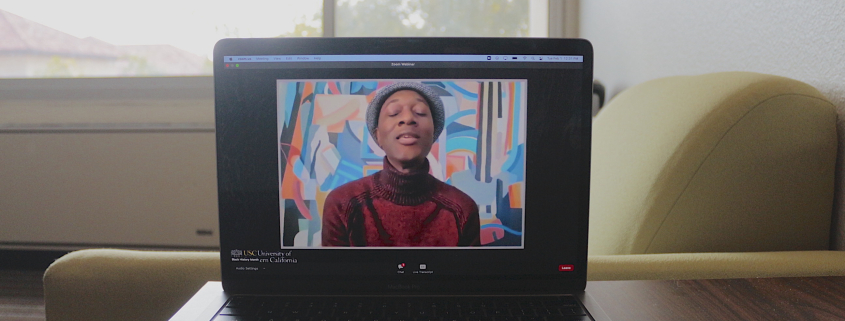Speakers celebrate Black History Month

Black History Month kicked off at USC in a Zoom Webinar with a prayer led by Reverend Najuma Smith-Pollard and Jamilla Johnson’s rendition of the Black National Anthem.
Johnson, a junior popular music performance major, said she was happy to be part of something “for [her] people” at USC, because in “every classroom” she walks into, she’s the only Black person.
“I was happy to be able to perform a song that means so much to so many people and represents, overcoming so much,” Johnson said. “I’m just happy to be able to be a part of that history and perform that for my peers.”
The event focused on this year’s Black History Month theme at USC: “Black joy” and “embracing health and vitality,” and it featured a mix of student, USC administrator and celebrity alumni speakers including President Carol Folt, Los Angeles Rams wide receiver Robert Woods and junior journalism major Reagan Griffin Jr.
After the national anthem, Harris introduced Folt, who spoke about the love and compassion Trojans have shown each other during the pandemic, USC’s and faculty’s anti-racism initiatives — including Vice Dean of the Gould School of Law Franita Tolson’s voting rights testimony on the Senate floor — and a “historic legacy of Black people” at USC.
“Gatherings like today’s tell us all that we’re not alone. We’re part of a vibrant community, and there is so much joy in our Black community. And we have a great event today and a great month ahead,” Folt said.
Folt introduced Woods, a USC alumnus, whose speech emphasized the importance of physical wellness during the pandemic. Afterward, Chief Inclusion and Diversity Officer Christopher Manning spoke about his own experiences experiencing imposter syndrome at an “exclusive University,” finding joy through Latin dance and the “diversity of Black and brown people [that] made up Chicago’s Latin dance scene.”
“One of the things that I think is very important for Black folk, in particular, is to really try to be intentional and find [joy] because without it, you can be in an experience where you’re being ground down by the day to day realities of existence, but you’re not doing anything to build yourself back up,” Manning said in an interview with the Daily Trojan.
Manning said the University is working to decrease the imposter syndrome he experienced by diversifying faculty hiring through creating training modules and implicit bias training for faculty search committees.
“The more that we can bring diversity to our professional ranks, the more our students can see people like themselves and have more confidence in their belongingness at this institution,” Manning said.
Griffin Jr. spoke not only about Black joy but also the need to “be honest” about USC’s impact as an institution. He cited USC’s contribution to gentrification, profiling by the Department of Public Safety, stigmatizing the South Central community and the need for change that goes beyond discussions.
“Once we’ve looked ourselves in the mirror and acknowledged the truth —that we are not an institution that historically has fostered and supported Black joy for students, faculty, staff and surrounding community — that we have in fact, done the exact opposite,” Griffin Jr. said. Once we’ve been honest with ourselves, about who we have been, it is then that we can begin to work to become who we hope to be.”
In an interview with the Daily Trojan, Griffin Jr. said that he wanted to make sure to emphasize Black joy in his speech but to also highlight the ways that USC “not upheld those values” of joy, health and vitality. Beyond conversations, he said USC should make an “intentional and substantial reallocation of resources” toward recruiting and uplifting Black students, faculty and staff.
“USC has to be honest with itself about the role that it’s played for its students and for the surrounding community,” Griffin Jr. said. “That was what I was trying to get across in my speech. And that’s what I hope people take to heart and really engage with critically after hearing what I had to say.”
The event also featured a speech from musician and alumnus Aloe Blacc, who spoke about his positive experiences at the University, breaking out into his hits such as “The Man” while speaking about the importance of mental health and finding joy in light of cultural and systematic “challenges to our physical and mental health.”
Broderick Leaks, director of counseling and mental health at USC Student Health, said that from an institutional perspective, it is important that the University is celebrating these themes at the “highest levels of the University in terms of leadership.” Leaks spoke about the importance of Black joy in light of the dehumanizing ways the world engages with the Black diaspora.
“Some people say that it is an act of resistance even in and of itself to have joy,” Leaks said. “And so I think it just shows the perseverance of our people to be able to hold on to humanity despite constant messages that were not human in some areas.”

